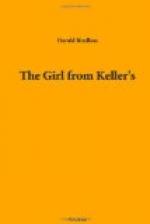He talked with better humor during the meal, but was silent afterwards and sat with half-closed eyes, stretching out his feet towards the crackling logs. Although the pain had nearly gone, it would, no doubt, begin again in the morning, and he might have some trouble in hiding his weakness from the foreman. He could lay off for a day or two, but as his wages would stop and his board would be charged, it would cost him something. Besides, if he laid off once or twice, he would be told to leave.
This, however, did not account for his moodiness. He knew of no cure except rest, but it was easy to find relief; a small dose of spirit would banish the pain for a time. The remedy was dangerous, particularly to him, since it offered an excuse for repeated indulgence, and he struggled with the temptation. Liquor was difficult to get, because there was no settlement for some distance and the engineers had tried to cut off supplies, but it could be got. In fact, Charnock knew where he could buy as much whisky as he wanted, at something above its proper price. So far he had not done so, but continued self-denial would require a stern effort. A drink would banish the pain and enable him to work.
He had not known it fail since he drove over to Wilkinson’s one afternoon, when he had been loading prairie hay since early morning and had forgotten his lunch. He reached the homestead scarcely able to sit upright on the driving seat, and a man asked him what was the matter. When Charnock told him he sent Wilkinson for whisky.
“I know all about it; the blamed thing grips me now and then if I work too hard and cut out a meal,” he said. “I’ll fix you up for the rest of the day, but won’t answer for your feeling pert to-morrow.”
As a matter of fact, Charnock had felt worse, but obtained relief by increasing the dose. Indeed, he had once or twice done so with unfortunate consequences; but after Sadie bought the farm and saw he led a regular life the pain had gone and had not returned until he went to work on the track. Now he was not going to give in, but did not want to talk, and was glad that Festing was occupied with some calculations and left him alone.
Next morning he felt better and had two days’ ease, after which the pain wrung him for the rest of the week. Somehow he stuck to his work, and his comrades, who were rudely sympathetic, helped him to elude the foreman’s watchfulness. It was obvious that he could not keep it up, but the trouble often ended suddenly. Then an evening came when he could scarcely drag himself to the bunk-house for supper. It had rained all day and the building was overheated by a glowing stove and filled with the smell of rank tobacco and steaming clothes. Charnock could not eat the roughly served food, and for a time sat slack and limp, with the sweat upon his face, and his arms on the table. Then he got on his feet awkwardly and set off for Festing’s shack.




